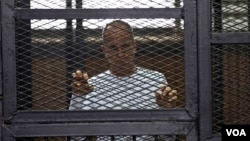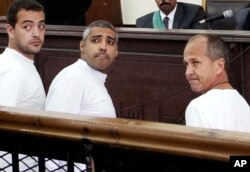Egypt deported an Al Jazeera journalist back to his home in Australia Sunday, releasing him from more than a year's imprisonment after his conviction for allegedly aiding the banned Muslim Brotherhood.
Peter Greste left Cairo on a flight to Cyprus en route to Australia, after Egyptian officials said President Abdel Fattah el-Sissi had approved Greste's deportation.
The journalist had been imprisoned for 400 days. He had been sentenced last year to a seven-year term on terrorism-related charges. As Greste was freed, an Egyptian security official said a second Al Jazeera journalist arrested with him in December 2013, Canadian-Egyptian Mohammed Fahmy, could be deported within days to Canada. He also was serving a seven-year term.
But there was no word on the fate of Egyptian Mohammed Baher, who was handed a 10-year term for also being in possession of a fired bullet casing.
The human rights watchdog Amnesty International welcomed the news of Greste's release and called for the others to be freed.
Al Jazeera also issued a statement welcoming Greste's release and demanding Egypt free its other two journalists. It said all three have to be exonerated.
The acting Director General of Al Jazeera Media Network, Mostefa Souag, described Greste's detention as an incredible and unjustifiable ordeal for the journalist and his family.
Egyptian authorities had accused the three men of providing a platform for former president Mohamed Morsi's Muslim Brotherhood, now declared a terrorist organization. But authorities provided no concrete evidence. The journalists and their supporters insist they were doing their jobs during a time of violent upheaval.
The journalists were widely seen as having been caught up in a regional power struggle between Egypt and Qatar, which funds Al Jazeera and had been a strong backer of Morsi. Greste's release follows a thawing of ties between Cairo and Doha.






